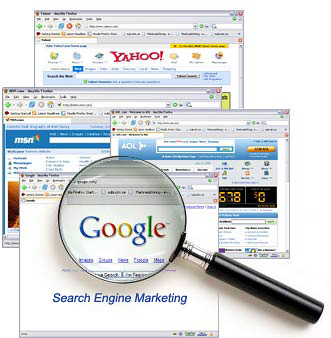Hello Friends, In my Previous post I have cleared that How Search Engine Works ?
Now, Here I am going to discuss about Search Engine Optimization. The process of Search Engine Optimization are of two types :-
(i) - On Page Optimization
(ii) - Off Page Optimization
On Page Optimization :-
On-page SEO is designing the website in friendly way. In these SEO search engine are tackled in a friendly way. Title of the website page can have the relevant and specific keywords so that it attracts more users and similarly knowing about the market demand can have competition with other websites or you can use specific keywords which are less used in other websites to catch traffic.
In this strategy we must follow Google Guidelines so that our Main site or Money site will not be penalize. I have mentioned here few points that comes on on page optimization. These are : -
1. Research work for keywords and phrases to select appropriate, relevant search terms.
2. Increasing back links from other related good website
3. Analysis and recommendations on main website structure, navigation, code, etc.
4. Recommendations as per requirement for additional web pages or content for targeted keywords
5. Optimization of Title, Description, Keyword & Image alt Meta Tags
6. Content Optimization- Implementation of H1/H2 & Bold tags to Content
7. Create SEO activities and website progress reports for keywords ranking and associated pages showing rankings in the major search engines like Google, Yahoo, Bing.
8. XML Sitemap Creation, Submission & Authentication on Google, Yahoo & Bing
Robots.txt Optimization
OFF Page Optimization :-
Off Page Optimization plays a very important role in making thousands of backlinks. In this method we linked our website to another website in order to get good response as well as backlinks. If you will look to good website that having good traffic as well as good backlinks then you will find that they have optimize their site in a regular way. Here I am just trying to say that if any website can reach to Top of the Search Engine pages so why We can't. Just need to do some extra effort and keep passion in order to get good results from search engines.
Any way, Here I am listing few tasks that should be apply for Off page Optimization. These are :-
1. Social Bookmarking
2. Blog Commenting
3. Forum Posting
4. Blog Postings
5. Free Classified Submission
6. Answers Community
7. RSS Submission
8. Article Submission
9. Yellow Pages
9. Directory Submission
10. Google Business Place
11. Google Reviews
12. Press Release
These are few basic difference in on page as well as off page. In my next blog post I will discuss each sub-topic in details. If you have any query then you can post a comment in comment box I will sure solve your all problems.
Now, Here I am going to discuss about Search Engine Optimization. The process of Search Engine Optimization are of two types :-
(i) - On Page Optimization
(ii) - Off Page Optimization
Image Source : danardvincente
On Page Optimization :-
On-page SEO is designing the website in friendly way. In these SEO search engine are tackled in a friendly way. Title of the website page can have the relevant and specific keywords so that it attracts more users and similarly knowing about the market demand can have competition with other websites or you can use specific keywords which are less used in other websites to catch traffic.
In this strategy we must follow Google Guidelines so that our Main site or Money site will not be penalize. I have mentioned here few points that comes on on page optimization. These are : -
1. Research work for keywords and phrases to select appropriate, relevant search terms.
2. Increasing back links from other related good website
3. Analysis and recommendations on main website structure, navigation, code, etc.
4. Recommendations as per requirement for additional web pages or content for targeted keywords
5. Optimization of Title, Description, Keyword & Image alt Meta Tags
6. Content Optimization- Implementation of H1/H2 & Bold tags to Content
7. Create SEO activities and website progress reports for keywords ranking and associated pages showing rankings in the major search engines like Google, Yahoo, Bing.
8. XML Sitemap Creation, Submission & Authentication on Google, Yahoo & Bing
Robots.txt Optimization
OFF Page Optimization :-
Off Page Optimization plays a very important role in making thousands of backlinks. In this method we linked our website to another website in order to get good response as well as backlinks. If you will look to good website that having good traffic as well as good backlinks then you will find that they have optimize their site in a regular way. Here I am just trying to say that if any website can reach to Top of the Search Engine pages so why We can't. Just need to do some extra effort and keep passion in order to get good results from search engines.
Any way, Here I am listing few tasks that should be apply for Off page Optimization. These are :-
1. Social Bookmarking
2. Blog Commenting
3. Forum Posting
4. Blog Postings
5. Free Classified Submission
6. Answers Community
7. RSS Submission
8. Article Submission
9. Yellow Pages
9. Directory Submission
10. Google Business Place
11. Google Reviews
12. Press Release
These are few basic difference in on page as well as off page. In my next blog post I will discuss each sub-topic in details. If you have any query then you can post a comment in comment box I will sure solve your all problems.








